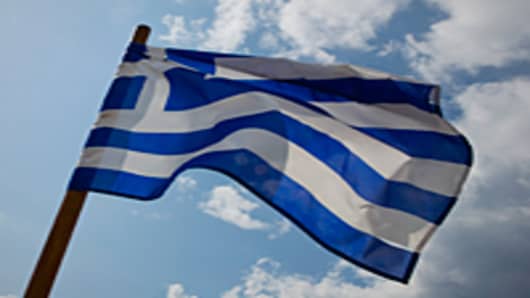The leaders of France and Germany on Tuesday joined forces to urge Greece to reaffirm its commitment to membership of the eurozone, after François Hollande flew to Berlin for talks with Angela Merkel, German chancellor, within hours of being installed as French president.
Both spelt out their concern that Greeceshould remain a full member of the common European currency , while promising to consider new measures to revive economic growth in the country. But they also agreed that Athens must carry out the austerity programme it has agreed with the European Union and the International Monetary Fund.
The Greek crisis emerged as the most urgent item on the Franco-German agenda, although both leaders insisted their meeting was primarily intended as a chance to get to know each other.
“We want Greece to stay in the euro,” Merkel said. “We know that the majority of people in Greece see that.”
The Greek government had also agreed on a rescue programme with the IMF and the EU after lengthy negotiations, she said. “I believe that memorandum must be respected.”
“We have to respect that there will be new electionsin Greece,” she added. “We will make it clear that we want Greece to remain in the euro zone, and that is what the citizens are voting on.”
That meant fulfilling the commitments in the EU and IMF programme, she said, but added: “We will also give proposals to Greece to encourage growth.”
Hollande went further, saying that “I hope that we can say to the Greeks that Europe is ready to add measures to help growth and support economic activity, so that there is a return to growth in Greece.”
Both leaders pledged to maintain the intimate Franco-German partnership with celebrations to mark the 50th anniversary of the 1963 Elysée treaty which launched their special relationship. They glossed over their political differences which saw Merkel openly backing Nicolas Sarkozy, the conservative incumbent, against Hollande, his socialist challenger in the French presidential election.
Hollande said political rivalry had not undermined the relationship in the past, but he stuck to his constant theme in his election campaign that Europe had to focus on reviving economic growth, as well as reducing public debt and budget deficits, which Merkel insists is a “precondition for sustainable growth”.
Pressed on the question of whether he was determined to renegotiate the German-inspired “fiscal pact” intended to reinforce budget discipline throughout the euro zone, Hollande said he wanted the concept of growth not merely mentioned, but really “pronounced” in the treaty.
“I want to see how this can be legally implemented,” he said. “I am pleased the French presidential campaign allowed us to put growth back at the centre of the debate.”
Merkel defended her belief that the common currency was “not just a monetary project, but a political project”. It meant that the member states of the euro zone shared a common responsibility. “People who have a common currency will never fight a war against each other,” she said.
Merkel said European leaders had been working on growth plans at their summit meetings in January and March, and would finalise them in June. They were intended to work alongside the fiscal pact to reinforce budget discipline.
She said that the two leaders had agreed to discuss all their ideas on measures to boost growth before the June summit, in order to reach a common package.


